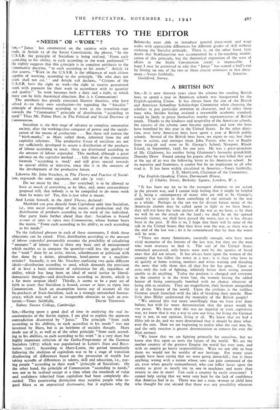SIR,—Having spent a good deal of time in analysing the
real in- contistencies of the Soviet regime, I am glad to explain the apparent contradiction discovered by " Janus." The principle " from each according to his abilities, to each according to his needs " was not invented by Marx, but is an heirloom of socialist thought. Marx made use of it, as well as of the other principle " from each accord- ing to his abilities, to each according to his work " in a very short but highly important criticism of the Gotha-Programme of the German Socialists (1875) which was popularised in Lenin's State and Revo- lution (1917). According to Marx-Lenin, the period immediately following the abolition of capitalism was to be a stage of transition disallowing all differences based on the possession of wealth but taking accos2tt of differences in talents, skill and education, i.e., pay- ing people " according to their work " (principle of Socialism). On the other hand, the principle of Communism "according to needs," was not to be realised except at a time when the standards of value and usefulness inherited from capitalism had been completely dis- carded. This penetrating distinction may surprise people who re- gard Marx as an unpractical doctrinaire, but it explains why the
Bolsheviks were able to introduce general piece-work and wage scales with appreciable differences for different grades of skill without violating the Socialist principle. There is, on the other hand, little doubt that Stakhanovism was accompanied by a far-reaching modifi- cation of this principle, but the theoretical exposition of the state of affairs in the Stalin Constitution (1936) is impeccable. I hope I may be permitted to add that " Janus " has scored a bull's-eye by hitting on one of the two or three crucial sentences in that docu-


























 Previous page
Previous page